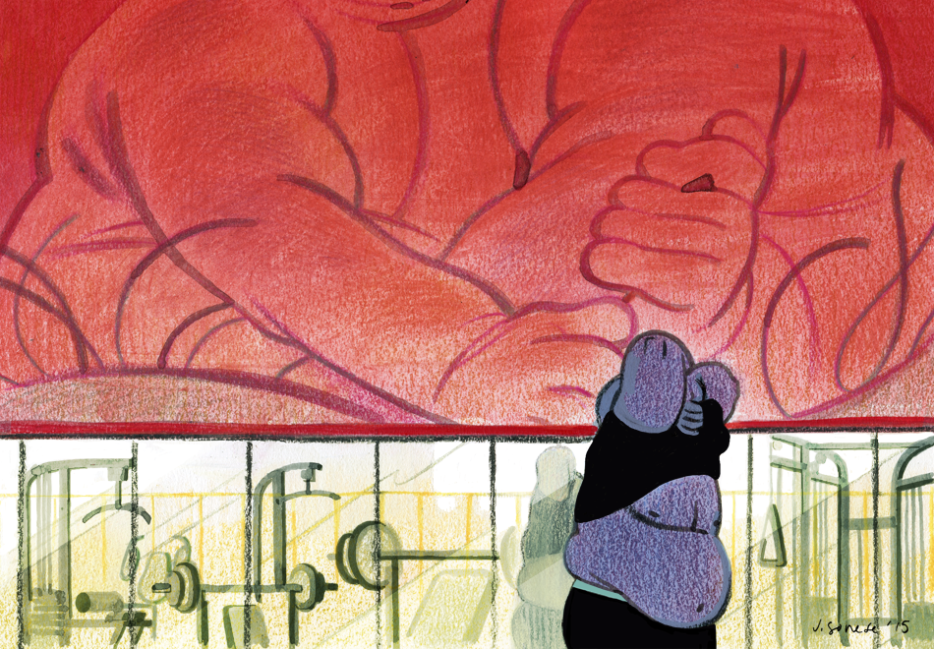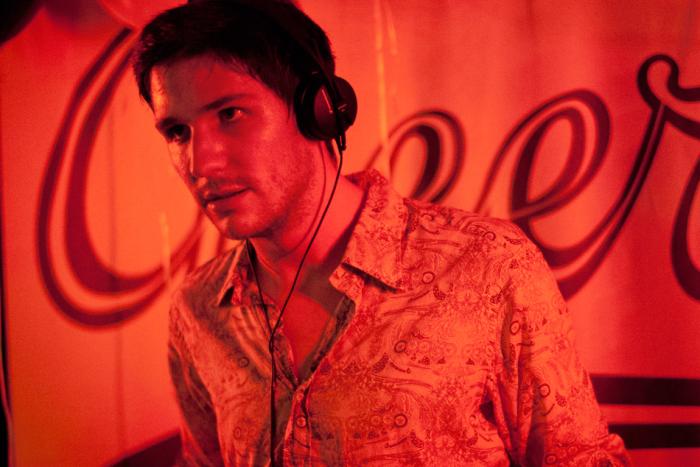They’re the chosen few, the yokozuna. Kakuryū Rikisaburō, Hakuhō Shō, Asashōryū Akinori…. Seventy-one in number by some counts, they’re sumo wrestling’s elite, named after the braided length of rope that wraps, confection-like, around each tectonic waist. They enter the ring with a disciplined dance of fat and muscle reserved only for their select ranks, known as the dosho iri. Shared across all sumo, however, is the shiko: An iconic raising of each leg, flexed skyward to the heavens and brought down with a thunderclap. It’s meant to scare demons. Imagine challenging Hell with thighs prowling, plump and absolute.
I don’t have to convince you of sumo’s heat—a 265-year-old sport can do that on its own. The magnetism of a match is hard to avoid: hair-trigger movements; glistening, heaving bodies; the suppleness of the entire thing. When mountains grapple, everything leaps.
I want to occupy as much space as possible. I want to exceed my boundaries. I want to blot out the sun. I want to eclipse this life and the next life and the one after that.
I want to be fatter. Thicker. Stronger, too.
A theory: We crave beauty because, like the unalterable spectra of light itself, it finds us, and not the other way around. We’re helpless to its whims. Beauty could seek us, or not. Beauty couldn’t care less. Power has the same allure—we only understand what it can do, and to whom, after a demonstration. Exactly how much of beauty or power is that elusiveness, I don’t know. But what I do know is that what I increasingly find magisterial, unquestionably beautiful, involves the smashing of 400-pound bellies. I’ve written about my attraction to fat people before, but this is… different.
The same winter I lost to Sumo YouTube (and Sumo Twitter), I spent mesmerized by Olympian Holly Mangold’s clean-and-jerks, explosive as a powder keg and effortless in organizing not one but several lifting forms in a matter of seconds; by Texas Rangers’ slab of marble Prince Fielder, characteristically squatting one of his teammates; I even plugged in my PS3 and revisited Tekken 6 to play as Bob, my favourite character in the entire series, also the fattest, and oddly free of the body shaming ridicule common to most video games. (Until the end. Avoid the ending. Never finish a game, is what I'm saying.)
It was a period of grand dislodging. Something was surfacing, that much was clear. GIFs, athletes, porcelain statues on eBay; I wanted to turn them over like artifacts from an older world. I slavishly searched out plump silhouettes; perhaps the feeling is better described as a gathering of signals. Intel. A means of accessing a desire I long sensed but could never articulate.
Mangold and Fielder. Hakuhō sending demons scurrying into the dark. I summoned them, or perhaps they summoned me, because they suggested a way of being I never thought I needed. They’re fat, sure—as am I. They’re awfully powerful, too.
If there’s any constancy to my figure, it’s that I’m 5’4. My weight has never stood still. Always oscillating across the spectrum of sizes, as if deeply afraid to commit.
I was the fat brown kid with the unusually wide hips. Junior high gym class solidified my place into school folklore—all it took was a single, undulating, “tittaaAAaaAAaay…!” the first time I took my shirt off in front of others.
I constantly drew myself, and similar figures, divining pear bottoms out of gestural drills. Rapacious vulpine things as full of themselves as I was, at least, internally. Decades later, that kind of sublimation feels a little too familiar. I was trying to map an identity as one would solve for x, knowing, somehow, that what I didn’t erase would project a truth about myself others could see as well. A selfie by way of a Lumograph 2B.
Were it easier to draw myself with a comet’s tail, a procession of selves trailing behind me like a slinky, annotating every extra chin, every time my thighs clapped a call and response, to anyone who would listen, I would have. But like the finality of my height, I grew comfortable with that everlasting softness. I felt cute.
I wasn’t doing anything memorable, the day the world clicked, but I do remember what came after, the interrogation after the impulse: How much space could I occupy?The nadir of my caroming weight was the years I spent working at the CBC. It’s almost a cliché, now, how the mid-early aughts feasted on Canada’s public broadcaster. Government-mandated cuts to its operating budget trickled down to all the young idiots (me) who thought a career in radio could be something more than a list of hopes and fears on the margins of a Mead 5-Star. Steady work was hard to come by, a contract longer than a few months impossible. With the constant threat of extinction looming, I didn’t work just one job, but several. Under the boot heel of workplace precarity, I ate sparingly if it meant squeezing in a few more shifts. I started to dissolve; I drooled; I developed a limp; I was dangerously below 100 pounds. My brain shrunk—it must have. There were weeks I went with no food at all.
There are no absolutes when comparing pain. I ask only a special dispensation for the relentless, roiling torture of starvation. Not hunger, but the actual sensation of wasting away. The process of witnessing a body dragged past the brink of simply forgetting a meal and persuading itself, slowly, that another will never come. An absence, ribs churning against skin. American Apparel caving where it shouldn’t. I remember not recognizing myself, my hips wide, still, but jutting out all wrong.
My brain was eating itself, sure, but OKCupid was popping.
It’s a peculiar calculus how malnutrition could lead to more sex. But somehow my awful angles were close enough to a body mainstream desire would allow. I’m not saying I drowned in dates, just that the number I did go on seemed impossible in a time when “ghoul” wasn’t on any dropdown menu. How could I be lost in the legs of others, and so alone in my own?
Even with the gauze of distance, I still don’t understand how I embodied any sort of appeal to anyone. What was sexy about an apparition?
It would be three years before I crawled out from under the CBC. Reclaiming the lost territory of my body was a slow, spasmodic process. A life’s work usually is.
I wasn’t doing anything memorable, the day the world clicked in nine words—I want to occupy as much space as possible—but I do remember what came after. Another question, the interrogation after the impulse: How much space could I occupy?
Gradually… then suddenly. That’s how I imagine gaining weight over the last few years. There was no fretting over a muffin top that denied my favourite denim. No record of the wagging tongue of my belt receding into obscurity. Looking back, the accretion of pounds felt effortless; I casually welcomed the letters L, XL, occasionally XXL, into my wardrobe. Clothes fell better the more space I took up. Sitting down, my hands naturally steeple over my stomach, a quiet Swiss cottage on a storybook hill.
Getting fatter was inevitable, and the clues were everywhere. I mean, this was what my body did, a pattern of behaviour alloyed by the impossible and admittedly tentative privilege of my early 30s. A fulfilling relationship, an actual job. (No more writing the word “job” on a piece of paper and eating it, as per precariat custom.) Many of the men in my extended family were proud, squat Telugu boys, too. The immutability of their sizes sealed what was to come.
And I’ve never felt more comfortable with myself. Here, with you, with my rolls.
On my best days I feel like a tank, or tank adjacent. Tank-ly. My body thrumming, lumbering. I’ve always wanted to lumber. On my worse days—fuck it—I’m gorgeous. Enough to ignore the Nth time I’ve caught a colleague staring at my belly before meeting my eyes, a comic inversion of the way people would speak to my forehead as my hairline started to give.
Which is why I'd like to go a step further: My waistline expanding, I yearn to be swole in concert. As desires go, that’s fairly pedestrian. Expected, even. But I’m taking it further than that. I want to be fatter. Significantly fatter, for no other reason than that it feels right. To me. I want to embody the beauty and power that runs at me at top speed, on Instagram, on Vine, on a clay ring in a prefecture in Japan, thunder thighs and all. (Male) Power fantasies have never interested me before. They’re far too sus, and should always be dragged under the loupe of introspection. What deficit was I really attending to? In what way was my admission a vulnerability laid bare? And did it matter?
When I admire Hakuhō mid-shiko, or Mangold at the apex of a lift, it isn’t to praise their bodies at work, wondrous as the mechanics are, but their dedication to them in a profession that only accepts them because sporps. What I admire in whom I’ve invoked is their courage to maintain those physiques at all, especially outside of professional sports. That is to say, outside of utility. Beyond a system that assigns bodies a moral identity by the amount of value it can extract from them.
Whether you're 160 pounds or 400, you can be accepted—if there's a reason, preferably curled into the sigil of a dollar (or yen).Early into his otherwise terrific essay, “The Sea of Crises,” Grantland writer Brian Phillips observed that the life of a sumo wrestler in training, of "eating, chores, training, eating, and serving as quasi-slaves to their senior stablemates (and eating)," was, to him, "somewhat horrifying." Quasi-slavery aside—we can all agree on the moral valence of what that word entails—his focus on eating habits was telling. Except as a prerequisite for a sport with a following, with centuries of heritage, with millions of yen at stake, this sort of lifestyle is something to fear.
More recently, the Internet met college league pitcher Ben Ancheff, who made waves for having the gall to exist at 300 pounds. “Is this man anything but heroic?” scoffed Deadspin’s Timothy Burke, after posting screencaps that focused on Ancheff’s build to such a degree you could feel Burke suckling around the lozenge of that word, “heroic.”
In a recent interview, Ancheff made a simple plea: “I hope people can see past my size and look at my athletic ability and my pitching skills." Can he live? Conditionally, yes.
Whether you're 160 pounds or 400, you can be accepted—if there's a reason, preferably curled into the sigil of a dollar (or yen). No one is spared this—fit, fat, or (jfc) dadbod—but the pressure to make a case for yourself is doubled, tripled, the valve ripped from its threading, if you stray from those predetermined boxes.

How do you tell anyone you want to be fatter than the sun? I didn’t say any of this when I first met Ben, who would become my personal trainer, at a cafe across from the gym I would eventually claim as my own. That you don’t want to lose any weight whatsoever, but prefer to jam the throttle the other way?
Short of scrawling “Fielder + ????” on a whiteboard and circling it again and again, I wasn’t sure how to communicate something I’ve felt my entire life, deep and hot in the marrow of my bones. I’d interviewed several trainers before him, trying to dowse compassion from people paid to blunt any sign of it. Few got what I was trying to do, their eyes betraying stilettoes of disgust in short, controlled bursts. I don’t blame them for believing that I was actually hoping to be talked out of my plan. That was to be expected; we’re trained to see each other as a series of corrections. “[Regarding] your weight,” said Ben, curving expectation almost immediately, “it’s your body. You get to decide how you want it to be.”
I take pride in my belly, its jiggle—subtle, like the twitch of eardrums—a reassuring buoy in the dark, bobbing along the vicissitudes of a new life.I’ve come to love the gym. In fact, I’m months into a regime of strength training, alternating the torture of my upper body with that of my legs three times a week. My days are a dreamy in-between of marvellous promise and brutal, often tearful work. Muscles ache. Muscles under muscles ache. At home, I tinker with a staple of modern lifting culture: the harrowing protein slurry, devoid of flavour but crucial to my post workout recovery. When the silt shakes are too much, I retreat to the comfort of chicken breasts bought in bulk, but even that’s just a stopgap. There’s no escaping the slurry, I’ve learnt.
Pausing the conveyor belt of meals, I flex half-naked in front of every reflective surface in our apartment. Lapping up the way light pools over my melanin and cuts out curves strange and new. Inspecting my hamstrings with a Talmudic eye, I’ve caught myself imagining a 3D wireframe of a figure emerging from hot plastic, the difference split between Jiraiya’s Caveman Guu and The Great Mouse Detective’s Dawson. I pose, I snap, I post with abandon.
I’ve always been vain, but preening like this is new. I felt I was never allowed to, certainly not publicly. (What were my older selfies saying, then, knowing now the disconnect between the confidence trick of a fire outfit that flattered my figure and the genuine swagger I now have for my wider self?)
But how else could I transmit the pleasure of perching under a squat rack and moving my conception of the known world? Or to explain the pride I take in capturing my belly for #tummytuesday, its jiggle—subtle, like the twitch of eardrums—a reassuring buoy in the dark, bobbing along the vicissitudes of a new life?
You might call this a form of resistance, carving out new rules of living, of being. One that isn't that unique, either! Type “bear” or “woof” or “furry” into a search field and you’ll find an endless stream of people who have, aesthetically at least, pledged themselves to similar values. I can't speak to their interiority, as it's foolish to infer too much from a desire hashtagged. And past experiences have proven that, in the case of bear culture, the typical spaces—filled with the white, bearded, upwardly mobile—haven't been entirely welcoming to someone brown and, until very recently, thick in all the wrong ways. But the alternatives to those spaces have. Almost entirely on tumblr, my selfies—those taken after the thickening—have accrued recognition from blogs dedicated to the fat, queer, and, tellingly, to people of colour. Or at least, spaces run by those who see no reason to exclude bodies like mine. “Mega giele  !!!!
!!!!  ” went one reblog. “#femmespiration,” another.
” went one reblog. “#femmespiration,” another.
Growing up in small-town Newfoundland, often the only brown person in any setting, was a life defined by ceilings. The low Tupperware of curdled skies, for one. The serrated mindfuck of being denied any sexual agency whatsoever. And so, to be desired, to be allowed to have desire, by your peers no less—there’s a lightness to game recognizing game, a collapsing of years of self-doubt repeated by patterns of people appraising your utility.
That it happens on my own terms makes it all the more delirious. This must be what it felt like for DJ Khaled, the moment he popped a cartoonishly oversized bottle of champagne underwater. Or Princess Mononoke’s Nago, the boar lord cleaved by an iron bullet. (Boars and pigs have taken a newfound significance. Totemic as a symbol of strength and decadence. Tasty, too.)
Look, I'm in a committed relationship with a darling partner who salivates over my curves as much as I do hers. This isn't an encomium to redrawing fidelity's terms. But what I've learnt is that the maw of male validation isn't a limitless gulf but a series of tributaries always seeking more land to carve in its wake. Working out, pigging out, however authentic this need to transform myself is, it doesn’t come without acknowledging the fact that there’s a market for my newfound shape.
I’m acutely aware of how I can access this desire easier than most others on the gender spectrum. North American culture is predicated on ceding men power, authority, and all the attendant benefits they confer, no matter their size. Women, or those who identify independent of their biologically assigned gender, or people with disabilities, aren’t afforded the same luxuries. I’m haunted by the words of another Olympic weightlifter, Sarah Robles, who lived in abject poverty to pursue her sport in her body. “You can get that sponsorship if you’re a super-built guy or a girl who looks good in a bikini. But not if you’re a girl who’s built like a guy.”
I know the pressure of making a case for usefulness well. It merely took the guise of another line of inquiry, almost benign in its simplicity. A way for polite company to address the question mark floating slightly above my increasing size.
“What's the goal?” (iMessage.)
“What’s the goal?” (Snapchat.)
“Really, tho. Why?” (Urinal.)
Asked over and over again, I've come to hate that question and all its permutations. If we think of a goal as a projection of our ideal self, situated in a better world, then by necessity the goal has to be perfect, scrubbed of all the failures and tearful compromises to come. And so goals are tidy. Seductive.
Wildly stabbing a finger at a GIF of Fielder and bleating "YAAAAS" is easy to transmit as an idea. But packaged as a goal, it belies the raw work it takes to even approach a drawing of his physique, of months, years, spent suffering through split squats, or pushing through the dysmorphia of registering a thousand minute changes across my body as no progress at all. Rarely can a goal capture the ecstasy of going up to a new set of weights.
The thinking goes that when people attempt something new, they do so to actualize a goal. In that way a goal is pliable, viscous. We tend to treat it like a liquid. We pour our goals into voids our current selves cannot possibly fill, that exist by some defect of personality or genetics, both indelibly pointing to a paucity of will, a weakness.
Perhaps goals are containers, in that they take those perceived weaknesses and line them up against similar narratives we've been trained to recognize. A friend of a friend had to lose weight for her wedding dress. Or bikini season is imminent. Heart disease runs in our family, see.
All are fine motives for change! And I wish anyone pursuing them the best, truly. But how narrow are these reasons when they come not from one’s own admission, but the inquisitive glare of others? When they're put, coyly, dismissively, in the form of that question: “What's the goal?”
In a way, they function as a confirmation of suspicion. When people ask me why I’ve started lifting or if I’m doing anything about my weight, it isn't always to empathize with the contours that brought me here—it is to demand a reason, an admission of failure. Who would want to get fatter? Your boy, for one. Hundreds more, probably.
Goals are often placeholders for questions with no real answers. And to see that, you first have to deny its gratification. And I know no better way than admitting that I don’t have a goal. The closest I can muster is, again, a yearning. In fact, I’m enjoying staying here. In the infinite middle space between before and whatever after might look like. There’s no target body for any of this. I delight in how my figure feels new every day. I grew up keenly aware of my body, but always in passing, distant like a bureaucrat. How that’s changed. Fat grows, cords tighten, all of it softening again, or staying put. I now have lats, I’ve been told. My shoulders widen as if in bloom. My thighs, I’m convinced, are not mine. What I’m doing is fetishizing myself, almost. I’d like to think I’m having an ongoing conversation with my discrete parts. All the same, there isn’t enough bandwidth to share how it feels, piloting the porcine mecha of me.
Have I traded one form of utility for another? In leaving behind those people super into spectres of death, have I just aligned the inevitability of my metabolism with another group? I don't know. Perhaps that's the fundamental problem with asking about goals at all. The very presence of that question reveals the impossibility of our current moment ever escaping utility’s orbit. What is beauty than that which is done elegantly? Utility, gilded.

A kind of abandon comes from tossing the need for a goal into the sun. Freedom in not caring where this decision might lead me.
Ben tells me what I've lifted after a gruelling set and, for a moment, the numbers impress, then slick past, like beads of water collecting on the hood of a car and streaking off into the night… Or a rivulet of beer that escapes slaking my thirst for the folds of my gut. All that matters is a handful of adjectives I've charged with an elemental meaning: fatter, stronger.
Am I greedy, indulging myself like this? Finding pleasure in a set of rules of my own devising? So be it. I will squeeze the hot fangs of lactic acid out of cords of muscle and struggle. I will fail. I will try again, those split squats slightly less impossible. I will happily gorge on a steak bigger than your torso. I will eat and eat and eat. I will trace fingers across my fat and love how I fill out a grey crew neck. I will send demons packing.






